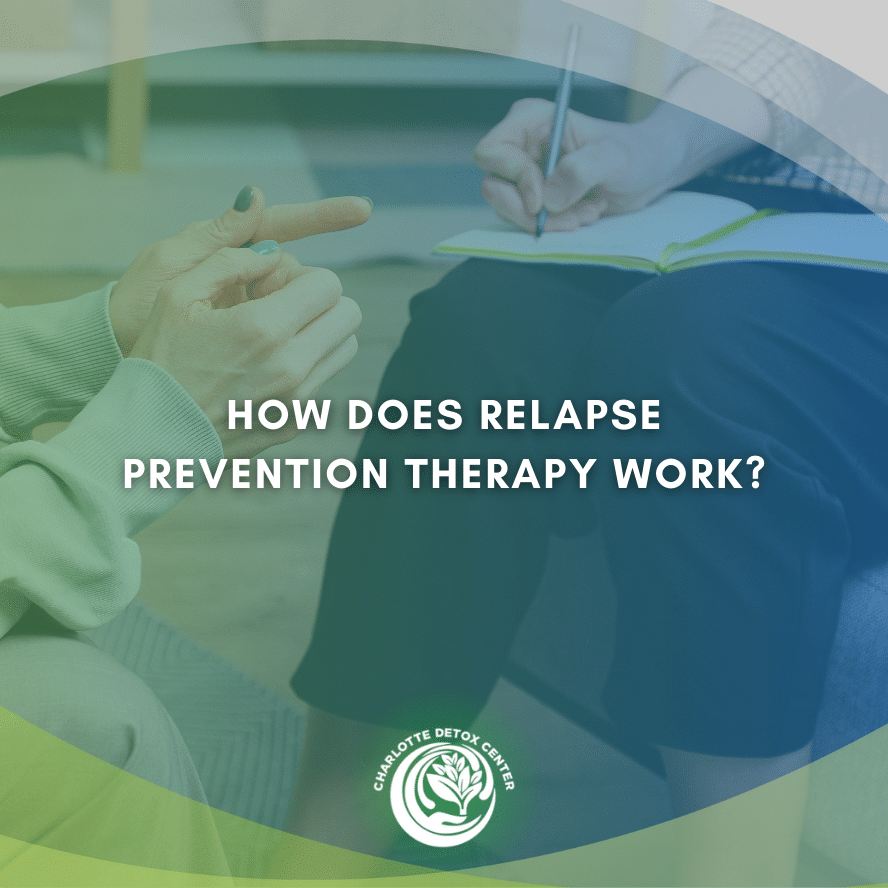How Does Relapse Prevention Therapy Work?

Medically Verified: 2/1/24
Medical Reviewer
Chief Editor

All of the information on this page has been reviewed and verified by a certified addiction professional.
While no one chooses to develop an addiction to drugs or alcohol, the addiction often becomes the center of a person’s life. Living with addiction can lead to serious, sometimes life-threatening consequences for a person’s mental and physical health, safety, well-being, and relationships.
Overcoming addiction often takes a significant amount of time, energy, patience, and support. Even after going through a treatment program, people may feel that life in recovery feels scary or uncertain. People may wonder what their life will look like and who may be in it.
One of the biggest fears for people in recovery is the fear of relapsing. A relapse occurs when someone begins to use drugs or alcohol after a period of sobriety. And while relapses are common in addiction recovery, they can feel like a major setback and make people question their ability to stay sober for life.
Relapse prevention therapy can help people prepare for life after leaving addiction behind and give them the tools they need to avoid relapse. Learning more about this form of therapy may help you make informed decisions about your care and prepare you for what’s next.
Understanding the Stages of a Relapse
In relapse prevention therapy, people work with a trained therapist to identify their triggers, recognize when a relapse is likely to occur, and develop coping skills to manage cravings.
A relapse usually happens in stages. Understanding the stages of relapse is an important part of preventing relapse from happening.
Emotional relapse is the first stage of the process of relapsing and may include:
- Getting out of your routine
- Missing therapy sessions or meetings
- Neglecting personal hygiene
- Sleeping poorly
- Poor eating habits
- Isolating from others
Mental relapse is the next stage. During this stage, people might feel nostalgic about substance use or consider using drugs and alcohol again. They may say or think things like:
- “I’ll hide it better this time.”
- “If I could stop once, I can do it again later.”
- “I deserve it because I’ve been working so hard.”
- “My addiction isn’t as bad as other people’s, so I don’t really have a problem.”
- “I have my drug use figured out now.”
- “I can always just go back to rehab.”
Physical relapse–the last stage of a relapse–includes using drugs or alcohol and all the steps, such as calling their dealer or driving to the liquor store– that lead up to it.
Relapse prevention therapy can help people learn how to identify the stages of a relapse and use healthy coping skills to get through them without using drugs or alcohol. It gives people a safe place to process feelings and thoughts about relapses and substance use and provides structure to create an effective relapse prevention plan.
How Does Relapse Prevention Therapy Work?
Relapse prevention therapy helps people create effective, realistic relapse prevention plans to support their sobriety. Relapse prevention therapy focuses on several key aspects of addiction and recovery.
The pros and cons of addiction
In relapse prevention therapy, people work with a trained therapist to identify their motivation for living a sober lifestyle while acknowledging what they’ve gotten from their substance use. Understanding substance use’s positive and negative aspects can help people create more effective relapse prevention plans.
Identifying triggers
Triggers are people, places, events, dates, and other scenarios that may cause cravings or relapse. For instance, some people may associate certain friends, a specific bar, or regular social gatherings that they associate with using drugs or alcohol. Knowing which situations are likely to lead to a relapse can help people prepare to avoid them or use coping skills to manage their cravings without giving in.
Learning new coping skills
When people can’t avoid their triggers, they must use coping skills to prevent relapse. This could be deep breathing, calling a sponsor or counselor, bringing a sober friend, or other healthy coping methods. In relapse prevention therapy, people work with a therapist to learn and practice healthy coping skills they can use in the real world.
Getting rid of myths
People may imagine that their problems will disappear once they get sober. They may hold specific ideas about what life in recovery will be like. During relapse prevention therapy, people work to develop a realistic view of what recovery will be like and prepare for the inevitable challenges and setbacks that will occur.
Gaining perspective on relapse
Relapses are common, with 40-60% of people in recovery experiencing at least one along the way. One of the goals of relapse prevention therapy is to help people accept relapses and move forward. When people see a relapse as a learning opportunity instead of a failure, they are more likely to recommit to sobriety and keep going.
Develop new routines that support sobriety
People in recovery must develop new, healthy habits that support the health of their body, mind, and relationships. Relapse prevention therapy focuses on helping people learn new skills and build routines that allow for work, rest, socialization, exercise, and regular meals. The better a person cares for their body and mind, the better they’ll be able to avoid relapse.
The goals of relapse prevention therapy are simple: to give people the skills they need to take care of their whole self and avoid relapse. When people have access to this essential therapy during addiction treatment, they are more likely to have better outcomes and more long-lasting sobriety.
Find Help Now
Recovery from addiction doesn’t need to be lonely or scary. Effective, compassionate treatment is available. Reach out to the Charlotte North Carolina Detox specialists today to learn about starting one of our comprehensive addiction treatment programs.
